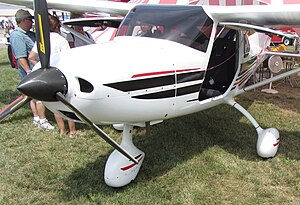
Summary
The TL Ultralight TL-3000 Sirius is a conventional single engine high wing ultralight and Light-sport aircraft seating two side-by-side. It was designed and is produced in the Czech Republic.
| TL-3000 Sirius | |
|---|---|

| |
| Role | Two seat ultralight and Light-sport aircraft |
| National origin | Czech Republic |
| Manufacturer | TL Ultralight, Hradec Králové |
| First flight | 21 May 2008 |
| Primary user | private pilot owners |
| Number built | 100 by 2015 |
Design and development edit
The Sirius programme was announced early in 2007 and an unflown prototype or mock-up appeared at Aero '07 that year. Development continued into 2010 before it was ready for production.[1]
The TL-3000 is a mostly composite aircraft with a carbon fibre wing and glass- and carbon-fibre fuselage. It shares many components with its TL-2000 Sting low wing stablemate. The high wing has a constant chord centre section and tapered outer panels with downturned tips and is braced to the lower fuselage with a pair of forward-leaning lift struts. The fin is swept, with a wide dorsal fillet, and carries a horn-balanced rudder. The tapered, mass-balanced elevators are set at mid-fuselage.[1][2]
The underwing cabin of the Sirius has a single piece windscreen, glazed side doors, rear side windows and an upper rear transparency. A choice of flat four engines offers either the 59.6 kW (80 hp) Rotax 912UL or the 73.5 kW (98.6 hp) Rotax 912 ULS. The Sirius is fitted with a fixed tricycle undercarriage with mainwheels fuselage mounted on composite cantilever spring legs. The nosewheel is steerable and the mainwheels have brakes; all wheels are almost completely enclosed in spats. The company has also developed a float installation for the TL-3000 to allow water operations.[1][2]
The Sirus first flew on 21 May 2008 but the prototype was lost in a fatal accident in July.[1]
The design has been accepted by the US Federal Aviation Administration as an approved special light-sport aircraft.[3]
Operational history edit
The Sirius was designed to fit into both the European ultralight and U.S. LSA categories. Twenty-two aircraft had been sold by September 2010 to customers in Angola, Australia, the Netherlands, New Zealand, Norway and the United States.[4] Only four appeared on the European (Russia excluded) civil aircraft registers in mid-2010, three in the Czech Republic and one in Norway.[5]
Specifications edit
Data from Jane's All the World's Aircraft 2010/11[1]
General characteristics
- Capacity: 2
- Length: 6.75 m (22 ft 2 in) excluding spinner
- Wingspan: 9.40 m (30 ft 10 in)
- Height: 2.25 m (7 ft 5 in)
- Wing area: 11.15 m2 (120.0 sq ft) gross
- Empty weight: 297 kg (655 lb)
- Max takeoff weight: 472.5 kg (1,042 lb) ultralight; LSA 598 kg (1,320 lb)
- Fuel capacity: 130 L (34.3 US gal; 28.6 Imp gal)
- Powerplant: 1 × Rotax 912ULS flat four, 59.6 kW (79.9 hp)
- Propellers: 3-bladed Woodcomp
Performance
- Maximum speed: 225 km/h (140 mph, 121 kn)
- Stall speed: 65 km/h (40 mph, 35 kn) flaps down
- Never exceed speed: 250 km/h (160 mph, 130 kn)
- Range: 1,400 km (870 mi, 760 nmi)
- Rate of climb: 6.0 m/s (1,180 ft/min) maximum, at sea level
See also edit
Aircraft of comparable role, configuration, and era
References edit
- ^ a b c d e Jackson, Paul (2010). Jane's All the World's Aircraft 2010-11. Coulsdon, Surrey: IHS Jane's. p. 181. ISBN 978-0-7106-2916-6.
- ^ a b Bayerl, Robby; Martin Berkemeier; et al: World Directory of Leisure Aviation 2011-12, page 82. WDLA UK, Lancaster UK, 2011. ISSN 1368-485X
- ^ Federal Aviation Administration (26 September 2016). "SLSA Make/Model Directory". Retrieved 22 March 2017.
- ^ Jackson, Paul (2011). Jane's All the World's Aircraft 2011-12. Coulsdon, Surrey: IHS Jane's. pp. 174–5. ISBN 978-0-7106-2955-5.
- ^ Partington, Dave (2010). European registers handbook 2010. Air Britain (Historians) Ltd. ISBN 978-0-85130-425-0.


